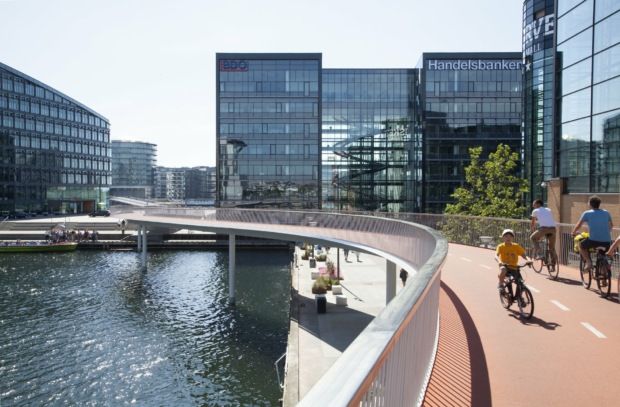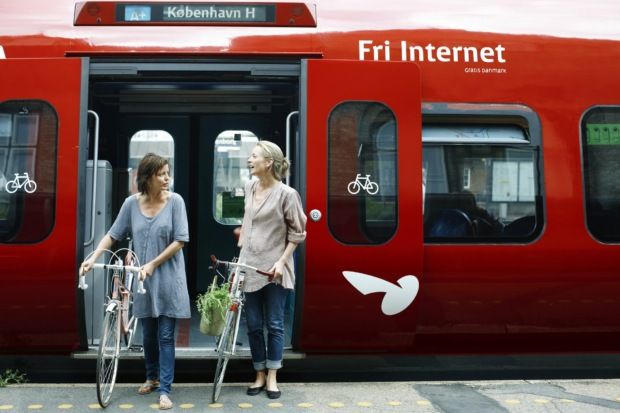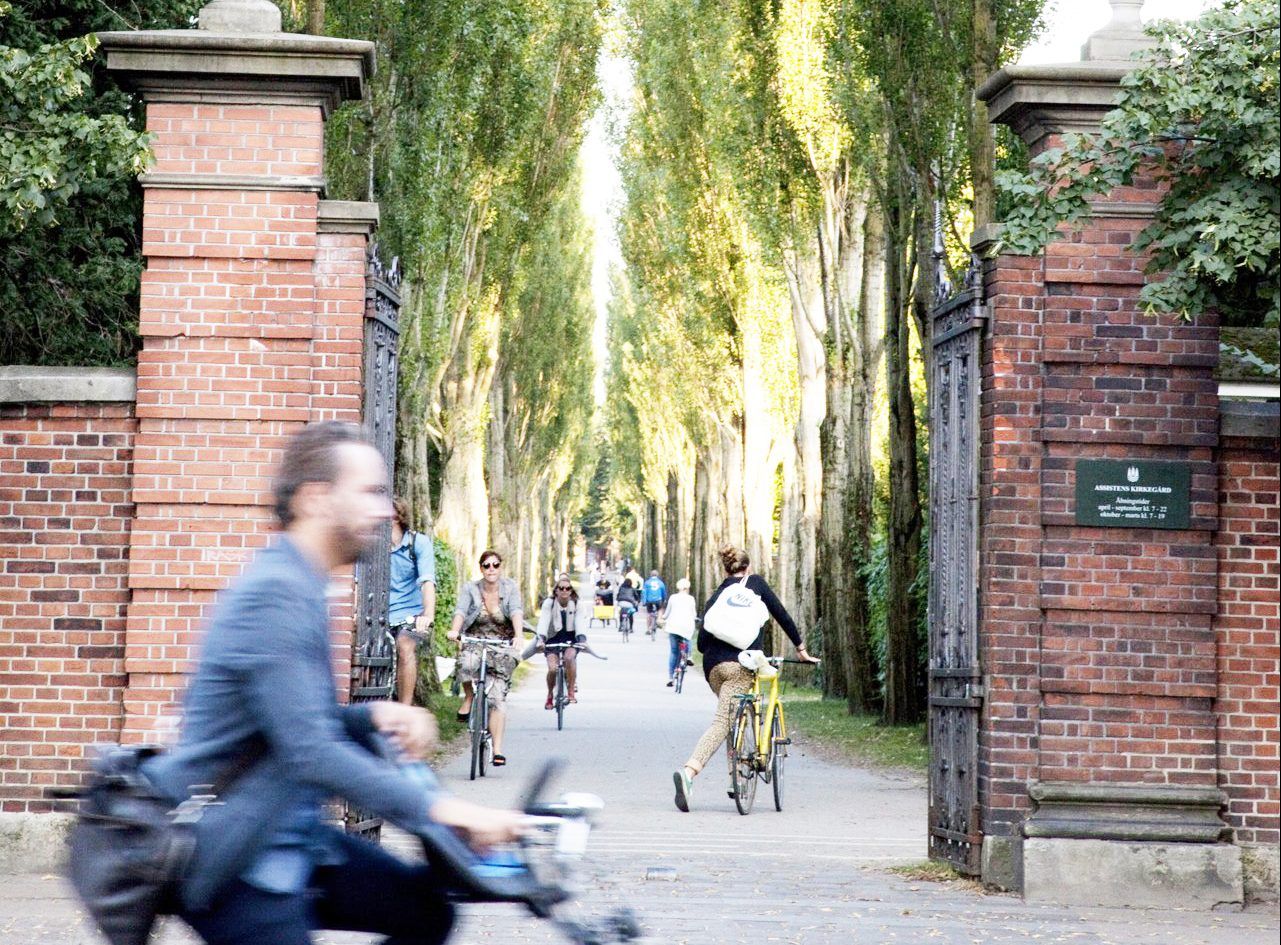In 1973, a Saudi-led oil embargo against the United States triggered a global energy crisis. The price of oil quadrupled, leading to fuel shortages and exposing the West’s reliance on foreign oil and fossil fuels.
In Denmark – a country that had to that point been eagerly embracing the automobile – crisis became opportunity. Alerted to the dangers of energy dependency, and stirred by a blossoming environmental movement, politicians, policymakers and city planners ambitiously sought out ways to reduce the use of imported oil.
First, they stepped up investment in renewable energy technologies such as wind and biomass, which now make up 67 percent of the country’s electricity supply.
Second, they bet on the strength of Danes’ quads, hams and glutes, abandoning plans for major road projects, pedestrianising more streets and planting the seeds of the country’s now extensive network of bike lanes.
In this way, an arcane, two-wheeled and human-powered contraption known as the bicycle came to emblemise Denmark’s green energy transition.
Greatest race and city
Owing to its investments in renewable energy and cycling infrastructure, Denmark is now on track to meet its 2050 net-zero emissions target. Nowhere has the bicycle played a bigger role in that transition than in Copenhagen, the Danish capital and cycling mecca that has its sights set on achieving net-zero emissions by 2025.
According to the Centre for Regional Development, cycling in the Capital Region of Denmark reduces carbon emissions by 110,000 tonnes per year. In Copenhagen, bikes outnumber cars by more than five-to-one and, every weekday, cyclists in the city cover a distance of about 1.4 million km – the equivalent of completing the Tour de France 400 times.
The city has been well-recognised for its success. In 2008, Copenhagen became the first city to receive the International Cycling Union’s Bike City label, and since 2015 it has held the title of the world’s most cycling-friendly city, according to the Copenhagenize Index – “the most comprehensive and holistic ranking of bicycle-friendly cities on planet Earth”.
Copenhagen is also acknowledged as one of three “pioneering, successful, and world-class cycling cities” by the Handshake project – a Horizon 2020-funded project under the EU’s CIVITAS Initiative. Alongside Amsterdam and Munich, Copenhagen is serving as a mentor city for European municipalities looking to make the transition to two wheels.
And, in the most recent testament to the Danes’ leadership in everyday cycling, the world’s most famous cycling race will visit the country for three days in July, traveling further north than it ever has before.
Christian Prudhomme, the general director of the tour, did not need much more persuasion once he had heard the tagline “the world’s greatest cycling race meets the world’s greatest cycling city”.

Enviable infrastructure
But what is it that makes Copenhagen the ‘world’s greatest cycling city’? How is it that 97 percent of Copenhageners are satisfied with the cycling conditions in the city?
It’s all about infrastructure.
From the iconic Cykelslangen, the car-free overpass snaking alongside the Fisketorvet shopping centre and over the harbour, to Den Grønne Sti, the greenway path winding through an old rail corridor, Copenhageners have ample options when it comes to navigating the city by bicycle.
Since 2005, Copenhagen has spent approximately 1 billion kroner on cycling infrastructure, and 13 bridges have been built to allow travel over the harbour and small waterways that divide the city. In all, investment has raised the total length of bike lanes in the city to a whopping 385 km, successfully encouraging many to make the switch from four wheels to two.
The Tour de France, which will kick off with a 13.2 km time trial through Copenhagen, will showcase some of the city’s world-class cycling infrastructure.
“This is a unique window to show the whole world how beautiful Denmark is, how we are using the bike every day, how our infrastructure for the bike lanes is, and how you can come around in Denmark by bike in the cities without being afraid,” Alex Pederson, the spokesperson for the Grand Départ in Denmark, told CPH POST.
The time trial will begin on Nørre Farimagsgade, from where the riders will make their first turn towards Copenhagen’s Dronning Louise’s Bridge – one of the most heavily trafficked cycling stretches in Denmark and the endpoint of the C95 cycling superhighway.
Shortly after, riders will loop back around at Fredensbro, the bridge where the C93 superhighway enters the city centre, and continue through the Trianglen junction, alongside Fælledparken, and past Parken Stadium.
They will then follow the twists and turns of the inner city, passing landmarks such as Amalienborg Palace, Marmorkirken, Kongens Nytorv, and the picturesque Nyhavn waterfront, before sprinting toward the finish line on HC Andersen’s Boulevard.
The following two days of the tour will see the riders pass from Roskilde to Nyborg, and then from Vejle through southern Jutland to Sønderborg just above the German border.
When they leave the country on July 3, two new cycle routes will be inaugurated, immortalising their path through the Danish countryside. The routes will be numbered 27 and 37, corresponding to the dates on which the Tour de France field will run them: 2/7 and 3/7.

The work is not yet done
As well as a celebration, the Tour de France in Denmark has also been a call to action. The Danish Ministry of Transport has declared 2022 Denmark’s ‘year of the bike’ and, as part of the country’s 2035 infrastructure plan, the Danish Parliament has agreed to spend 3 billion kroner on cycling over the next several years.
The 160 billion kroner infrastructure package also includes 64 billion kroner for roads and 86 billion kroner for public transport. As of May, 200 million kroner had been set aside for 39 bicycle projects across the country in 2022. These numbers do not account for municipally-funded transport projects.
According to Jens Peter Hansen, the national chair for Cyklistforbundet, the Danish cyclists’ federation, continued investment in cycling infrastructure is crucial – particularly at a national level.
Cycling culture in Denmark is by no means confined to Copenhagen – nine out of 10 Danes own a bicycle and 12,000 km of cycle paths exist throughout the country – but the capital city is something of an outlier, says Hansen.
According to city figures, 62 percent of Copenhagen’s residents are now commuting by bike. In Aarhus – the country’s second biggest city – only around 25 percent of residents get to work on two wheels.
More troubling, contends Hansen, is that cycling in Denmark has been in decline since 2014 and has in fact begun to drop in Copenhagen as well. To combat the decline in cycling, “you have to make better infrastructure for cycling, and you have to stop trying to make better infrastructure for cars,” he told CPH POST.
He adds, however, that better infrastructure does not just mean more bike lanes: “It’s more important to talk about space and not just lanes.”
In Copenhagen, he contends, half of all the space between houses is dedicated to cars, while cycling infrastructure takes up only around 10 percent.
Besides infrastructure, Hansen argues that policies must be implemented to make cycling the safer, more convenient and more rewarding transport option. On this basis, he supports the recent push to lower speed limits in the capital. He also supports the implementation of a Belgian policy by which employees of participating organisations receive a financial incentive to bike to work.
For those living outside major cities, he recognises the challenge of making cycling the more attractive alternative – a concern shared by Trine Bramsen, the Danish transport minister.
Both say that finding better ways to combine cycling and public transport is vital for this purpose, and they similarly agree that the rise of electric bikes could be a gamechanger for making longer distances feasible without a car.
“Swiss army knife of society”
As reported by the Danish Finance Ministry, Copenhagen experiences an economic gain of 4.80 kroner every time someone rides 1 km on their bike.
As Bramsen puts it: “Society saves a lot of money every time a bicycle is used instead of a car.”
For Hansen, it’s about the way these savings come to be: by addressing societal challenges related to health, congestion, safety and the environment.
“Cycling is the Swiss army knife of society. No matter what kind of problem society faces, cycling can help solve the problem,” says Hansen.
It takes money to save money, and to reap the benefits of cycling, Denmark must keep investing in it. It’s not a matter of whether we can afford to, it’s whether we can afford not to.”














